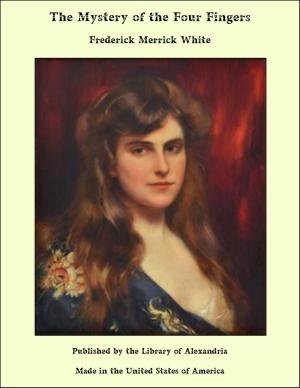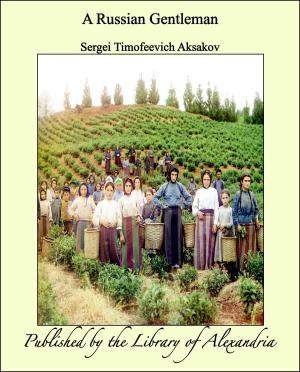| Author: | Lidia Ivanovna Veselitskaya | ISBN: | 9781465618924 |
| Publisher: | Library of Alexandria | Publication: | March 8, 2015 |
| Imprint: | Language: | English |
| Author: | Lidia Ivanovna Veselitskaya |
| ISBN: | 9781465618924 |
| Publisher: | Library of Alexandria |
| Publication: | March 8, 2015 |
| Imprint: | |
| Language: | English |
The genius of Turgeniev and Tolstoy, of Dostoevsky and Gorky, has given fame and distinction to the Russian novel, but while the principal works of these great writers and their fellows are well known to English readers, the women novelists of Russia have been left almost untouched by the translator. Yet there are many authoresses of talent in the literary world of Russia at the present day; notably Madame Dmitrieva, born 1859, of peasant parents. Her first novel was entitled From the Heart not from the Head. Two of her best-known books are Mityukha, the Schoolmaster, and In Various Directions. She has said that "her first school was the village street, and her teachers, the grey old village folk and dire need." Other writers of ability are Olga Chumina (born 1864), who has translated several poems by Francis Coppée, and also produced a play entitled The Flicker that Went Out; Madame Smirnov, author of the powerful novel, The Salt of the Earth; M. V. Krestovskaya (born 1862), whose stories of theatrical life have the charm of simplicity and truth, and whose Woman-Artist appeared in the Journal des Débats; Madame Verbitskaya, who attained an extraordinary popularity with her daring novel The Keys of Happiness; and Madame Lidia Ivanovna Veselitskaya, who, under the pseudonym of V. Mikoulitch, has written sketches of Russian society which are full of humour and clever characterisation. The best known are the series entitled Mimi's Marriage, Mimi (or Mimotchka) at the Springs, and Mimi Poisons Herself, which have been translated into no less than six European languages. The writer of these genial satires on the weaknesses of her sex was born in 1857. She belonged to a noble family with estates in Southern Russia, and was educated at the Pavlovsk Institute, one of the great schools for women in Russia. Soon after her debut in society, she married an officer in the Russian army. She began her literary career with some simple tales intended for young people; Family Evenings, In the Family and in the School, and Of Children's Reading, but in 1883 she struck a bolder note with Mimotchka, the Bride, or Mimi's Marriage, which made its first appearance in the Vestnik Evropy, a leading Russian monthly review. But it was not until the second of the series,Mimotchka at the Springs, was published seven years later that "V. Mikoulitch" sprang to her present position of widespread popularity. The witty superficiality of the chapters descriptive of Mimi's girlhood develops in Mimi at the Springs into a brilliant, incisive study of a selfish, empty-headed, and exceedingly pretty young woman. The analysis of her character is so penetrating and pitiless that Tolstoy, who admired the book, remarked that "the author must be a man, as no woman would be so frank in writing of her own sex." Mimi bears a surface resemblance to Anna Karenina, but she escapes the whirl-pool of passion that engulfed Tolstoy's ill-starred heroine, and glides almost unscathed through the romantic episode of l'homme au chien. The latter, though only lightly sketched in, is a cleverly suggested portrait of a cultivated and elegant Russian of the wealthy upper classes who, if he permits himself an occasional lapse from conjugal fidelity, trims the balance by the "correction" of his manners. He is a past master in the art of guiding a novice through the mazes of flirtation and emerging free from entanglement. At the end of it all Mimi's heart is touched but not broken. Perhaps she Was even slightly disillusioned by the calmness with which her "correct" admirer met the crisis of her departure from the Caucasus.
The genius of Turgeniev and Tolstoy, of Dostoevsky and Gorky, has given fame and distinction to the Russian novel, but while the principal works of these great writers and their fellows are well known to English readers, the women novelists of Russia have been left almost untouched by the translator. Yet there are many authoresses of talent in the literary world of Russia at the present day; notably Madame Dmitrieva, born 1859, of peasant parents. Her first novel was entitled From the Heart not from the Head. Two of her best-known books are Mityukha, the Schoolmaster, and In Various Directions. She has said that "her first school was the village street, and her teachers, the grey old village folk and dire need." Other writers of ability are Olga Chumina (born 1864), who has translated several poems by Francis Coppée, and also produced a play entitled The Flicker that Went Out; Madame Smirnov, author of the powerful novel, The Salt of the Earth; M. V. Krestovskaya (born 1862), whose stories of theatrical life have the charm of simplicity and truth, and whose Woman-Artist appeared in the Journal des Débats; Madame Verbitskaya, who attained an extraordinary popularity with her daring novel The Keys of Happiness; and Madame Lidia Ivanovna Veselitskaya, who, under the pseudonym of V. Mikoulitch, has written sketches of Russian society which are full of humour and clever characterisation. The best known are the series entitled Mimi's Marriage, Mimi (or Mimotchka) at the Springs, and Mimi Poisons Herself, which have been translated into no less than six European languages. The writer of these genial satires on the weaknesses of her sex was born in 1857. She belonged to a noble family with estates in Southern Russia, and was educated at the Pavlovsk Institute, one of the great schools for women in Russia. Soon after her debut in society, she married an officer in the Russian army. She began her literary career with some simple tales intended for young people; Family Evenings, In the Family and in the School, and Of Children's Reading, but in 1883 she struck a bolder note with Mimotchka, the Bride, or Mimi's Marriage, which made its first appearance in the Vestnik Evropy, a leading Russian monthly review. But it was not until the second of the series,Mimotchka at the Springs, was published seven years later that "V. Mikoulitch" sprang to her present position of widespread popularity. The witty superficiality of the chapters descriptive of Mimi's girlhood develops in Mimi at the Springs into a brilliant, incisive study of a selfish, empty-headed, and exceedingly pretty young woman. The analysis of her character is so penetrating and pitiless that Tolstoy, who admired the book, remarked that "the author must be a man, as no woman would be so frank in writing of her own sex." Mimi bears a surface resemblance to Anna Karenina, but she escapes the whirl-pool of passion that engulfed Tolstoy's ill-starred heroine, and glides almost unscathed through the romantic episode of l'homme au chien. The latter, though only lightly sketched in, is a cleverly suggested portrait of a cultivated and elegant Russian of the wealthy upper classes who, if he permits himself an occasional lapse from conjugal fidelity, trims the balance by the "correction" of his manners. He is a past master in the art of guiding a novice through the mazes of flirtation and emerging free from entanglement. At the end of it all Mimi's heart is touched but not broken. Perhaps she Was even slightly disillusioned by the calmness with which her "correct" admirer met the crisis of her departure from the Caucasus.















